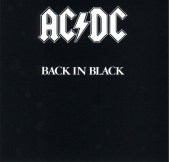Good morning!
Friday’s questions are HERE. I can confirm that Dave Carpenter finished the Philadelphia Half Marathon – and ran it while wearing his firefighting gear. Great job Dave!
Before I get to the answers, I’d be remiss not to mention the passing of Malcolm Young. I often include musical references in my blog posts, in particular in the #fiveforfriday legal ethics quizzes.
It’d be a violation of Rule 4.1 for me to tell you that I am a huge fan of AC/DC. However, it’s not a violation to state that I’m a huge fan of the Back in Black album. Personally, I think the B-side is the best B-side of any rock album. Also, the album played an important role in my music fandom.
Last night, I confirmed with the First Brother that Back in Black was the first album that either of us bought on our own. Before snagging it at a flea market at our elementary school, we’d been confined to our parents’ albums (and 8-tracks). I don’t think either of us will ever forget (or regret) learning every word to each of The Mamas & The Papas greatest hits. Nevertheless, Back in Black marked the beginning of our passage to musical adulthood.
Malcolm – if there’s a bar wherever you are, have a drink on me.

Oh yeah, don’t forget to send me your votes for the top 3 novels that focus on the law, a lawyer, or lawyers!
Onto the answers!
Honor Roll
- Karen Allen, Esq.
- Matthew Anderson, Pratt Vreeland Kennelly & White
- Penny Benelli, Dakin & Benelli
- Alberto Bernabe, Professor, John Marshall Law School
- Andrew Costello, Leeds Brown Law
- Bob Grundstein, Esq.
- Anthony Iarrapino, Wilscheck Iarrapino Law Office
- Keith Kasper, McCormick, Fitzpatrick, Kasper & Burchard
- Patrick Kennedy, First Brother, My Web Grocer
- Kevin Lumpkin, Sheehey Furlong & Behm
- Lon McClintock, McClintock Law Offices
- Jack McCullough, Project Director, Vermont Mental Health Law Project
- Jeffrey Messina, Bergeron Paradis Fitzpatrick
- Hal Miller, First American
- Herb Ogden, Esq.
- Kane Smart, Agency of Natural Resources, Office of General Counsel
- Robyn Sweet, CORE Registered Paralegal, Cleary Shahi & Aicher
- The Justice League of Windsor County
- Jordana Levine, Audrey Smith, Nikki South, Rachel Thompson
- Carole Zangla, Grafton County (NH) Senior Citizens Council
Answers
Question 1
Attorney called me with an inquiry. I listened, then said “your only duty under the Rules of Professional Conduct is to notify the sender that you received it.”
Most likely, then, Attorney called me to discuss the receipt of:
- A. A wire transfer.
- B. Information that Attorney knows was inadvertently sent or produced. See, Rule. 4.4(b)
- C. A subpoena to testify about a former client.
- D. A request to deliver a former client’s file to a new attorney.
Question 2
By rule, two words have to be on a certain type of communication from lawyers. What are the 2 words?
- A. “Advertising Material.” See, Rule 7.3(c).
- B. “Of Counsel.”
- C. “Confidential Information.”
- D. “Privileged Information.”
Question 3
True or false: the rules prohibit a lawyer from serving as a director, officer or member of a legal services organization (other than the lawyer’s firm) that serves persons having interests adverse to a client of the lawyer.
False. Rule 6.3.
Question 4
Lawyer represents Client. Opposing Party is not represented by counsel.
Lawyer and Opposing Party negotiate a resolution that must be reduced to writing. Lawyer prepares the document and presents it to Opposing Party for signature. Opposing Party asks “what do you think it means if I sign this?”
Which is most accurate?
- A. Lawyer may not respond other than to say “I can’t give you any advice.”
- B. Lawyer must advise Opposing Party to contact an attorney for advice.
- C. Lawyer may not go through with the resolution until Opposing Party has been given a reasonable period of time to contact an attorney for advice.
- D. Lawyer may explain her own view of the meaning of the document, as well as her view of its underlying legal obligations.
Maybe this was poorly phrased. But, “D’ is correct under the rule. It’s Rule 4.3. The key langauge is in the final sentence of Comment [2]: “So long as the lawyer has explained that the lawyer represents and adverse party and is not representing the person, the lawyer may inform the person of the terms on which enter into an agreement or settle a matter, prepare documents that require the person’s signature and explain the lawyer’s own view of the meaning of the document or the lawyer’s view of the underlying legal obligations.” (emphasis added).
B is not correct. The rule does not mandate Lawyer to advise Opposing Party to contact an attorney for legal advice. Rather, IF Lawyer gives any advice, the only advice she may give is to seek legal advice.
Question 5
Who am I?
In 2011 and 2014, I won the Emmy for Outstanding Actress in a Drama. I won for a role in which I played a lawyer who, among other things, graduated at the top of her law school class despite a penchant for falling asleep in class. In the very first episode, viewers learned the my husband, a state prosecutor, had been jailed for his part in a sex & corruption scandal.
But what would this question be without a connection to 1995?
Back then, I didn’t play a lawyer. Rather, I played a nurse. But even back then, I did it well. In 1995, I won the Emmy for Outstanding Supporting Actress in a Drama.
Interestingly, in TV world, I didn’t have to move. As both a nurse & lawyer, I worked in the same city.
Again, who am I?
Julianna Margulies. In 2011 & 2014, I won for my role as Alicia Florrick on The Good Wife. In 1995, I won for my role as Carol Hathaway on ER.

 Advertisements
Share this:
Advertisements
Share this:




